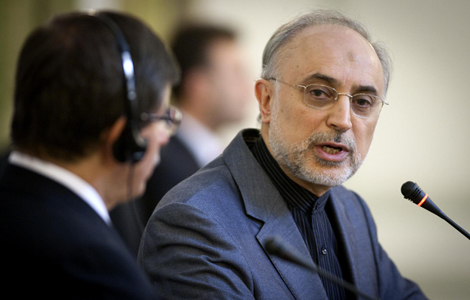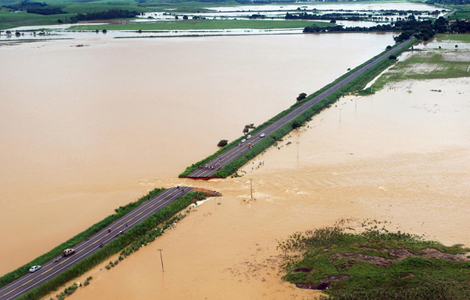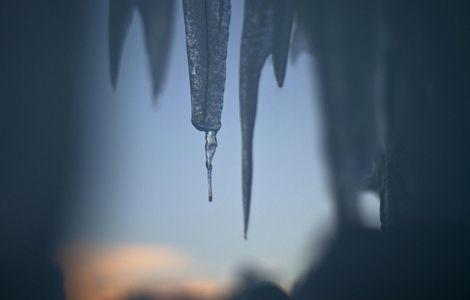Beijing to gauge air quality with PM2.5
Updated: 2012-01-06 04:28
(Xinhua)
|
|||||||||
BEIJING - The public will be able to view Beijing air-quality monitoring data using the PM2.5 gauge for the first time, as authorities plan to release it before the Spring Festival holiday begins on Jan 23, an official with Beijing's Municipal Environmental Protection Bureau said Thursday.
The much-discussed data, previously only available for laboratory use and not disclosed to the public, will be released every hour via the bureau's website and other media, said Zhao Yue, deputy director of the Beijing Municipal Environmental Monitoring Center.
Beijing's Municipal Environmental Protection Bureau is now working to increase its number of monitoring substations, as this will allow it to release real-time PM2.5 data by the end of 2012, said Zhao.
The Municipal Environmental Protection Bureau will gradually release the data after each monitoring substation is established, she added.
Beijing will also release hourly measurements of three other types of airborne matter (sulfur dioxide, nitrogen dioxide and inhaleable particles) instead of only the daily average.
The Ministry of Environmental Protection said it has been considering revising the present standards. A new index standard that includes PM2.5 and ozone density measurements is scheduled to be fully implemented nationwide in 2016, with pilot projects conducted in certain regions ahead of the national deadline.
Beijing's air quality has raised serious public concerns in recent years.
The PM2.5 data shows the results of tests for airborne particulate matter under 2.5 micrometers in size. It has never previously been made available to the public, with data released relating only to denser matter. PM2.5 is held to be a more accurate reflection of air quality than other standards of measurement.
In 2006, the environmental monitoring center started taking PM2.5 measurements for use by scientists, and set up substations for PM2.5 monitoring after the 2008 Olympic Games, she said.
At present, there are only six substations in Beijing equipped to monitor PM2.5.
The public debate on PM2.5 and PM10 first began when it came to light that air-quality monitoring results released by Beijing's weather forecast station and the US Embassy in Beijing often differed.
While the results from the embassy often described Beijing's air quality as "hazardous" or "dangerous," the Beijing weather forecast station would describe the pollution as "minor." Both sources defended their stances by saying that the difference resulted from using different measurement standards.
China currently uses PM10, or particular matter under 10 micrometers, to measure air quality.
The public has urged government authorities to apply the tighter PM2.5 standard, which measures finer matter that is considered more hazardous to people's health, as it can go deeper into the lungs.
"There is an apparent gap between official data and the citizens' feelings about air quality. There is an urgent need for a monitoring system that is closer to reality," said Li Yan, a PhD student of urban and environmental engineering in Beijing.
It is expected that the coming monitoring data including PM2.5 will be more transparent, he said.
Beijing will change the way it releases the figures to include measurements taken by substations scattered around the city, Zhao said.
According to current statistics, "blue sky days" in Beijing are expected to decrease in the near future, said Zhu Tong, a professor at the College of Environmental Sciences and Engineering under Peking University.
The Beijing Municipal Environmental Protection Bureau said the capital's air quality has actually been improving since 2008.
In 2011, Beijing enjoyed 286 days of "blue skies," or 78.4 percent of the year.
Beijing uses a five-level air quality classification system, with "grade I" representing the best quality and "grade V" representing the worst. Days with grade I or II air quality are considered "blue sky days."
Beijing will make efforts this year to improve air quality and reduce the PM2.5 level, said Liu Qi, secretary of the Beijing Municipal Committee of the Communist Party of China (CPC).
Related Stories
Air-quality center opens to private observers 2011-11-09 08:02
Beijing blackout as air quality unmasked 2011-12-06 13:41
Tighter air quality monitoring in Beijing 2011-11-07 17:17
China proposes tighter air quality index 2011-11-17 04:41
Hot Topics
Kim Jong-il, Mengniu, train crash probe, Vaclav Havel, New Year, coast guard death, Internet security, Mekong River, Strait of Hormuz, economic work conference
Editor's Picks

|

|

|

|

|

|







